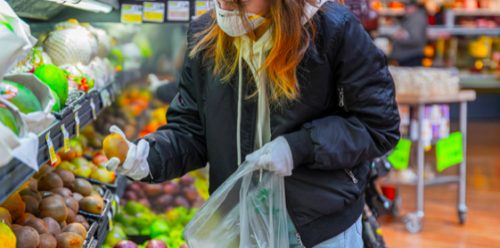The Detailed Preparation Guide for Home-Isolation

Stepping into home-isolation can be daunting. Creating and ticking-off a check-list will massively benefit you here.
Your Living Space
An inadequate living space will make proper hygiene impossible, putting both you and your family at risk.
- Make sure your room is well-ventilated.
- If you are a patient, use a dedicated toilet assigned only for you. If there is only one toilet, be the last one in the family to it. Always disinfect the toilet after use.
- If you are a patient, assign yourself a separate room and avoid contact with the elderly and pregnant women. Assign a single person in the house to take care of you.
- Assign a hot zone at the entrance of your home if a member of your family needs to go out daily for essential purposes. Remove clothing, which may be contaminated, at the hot-zone and promptly take showers after coming from outside. Disinfect the hot zone regularly.
Hygiene Products
Proper hygiene is one of the primary defence tactics against COVID-19.
- Keep well-stocked on soap and disinfectants.
- Diluted household bleach solution or 1% sodium hypochlorite solution can be effectively used as a disinfectant.
- Keep a reserve of alcohol-based hand-sanitizer at hand. Use these if you run out of soap.
- Keep stocked on regular detergent for washing clothes.
- Buy alcohol-based wipes or spray containing at least 70% alcohol.
Use caution, as following:
- Wear skin protection and consider eye-protection for potential splashes.
- Use the recommended amount on the disinfectant’s label.
- Use water as a diluting agent unless stated otherwise on the label.
- Avoid mixing chemical product.
- Avoid consumption, injection, or sniffing of disinfectants.
- Keep them out of the reach of children.
Medical Supply
Avoid self-medicating as much as possible and try to call your health care provider first when needing guidance.
- Keep existing medical conditions in mind before isolating. Call you doctor and follow his advice, for example, on how much prescription medication to save and how to take it.
- Keep a first-aid kit handy.
- If you are a patient, wear a triple-layer medical mask at all times. Discard the mask after 8 hours of use, or if visibly wet or soiled. Never re-use surgical masks and disinfect before throwing out.
- Stock up on disposable paper-towels and tissues to sneeze into instead of the palms of your hands.
- Buy a thermometer.
Self-Tracking Your Health
If you feel you might have a fever, it is intelligent to keep track of your body’s temperature and pulse rate.
For the most part, patients of COVID-19 do not need hospitalization; however, social isolation is quintessential. It is also recommended that you download the Arogya Setu app.
- Create a chart for traking both the temperature and the pulse rate every morning and every evening.
- Place the thermometer under the side of your tongue and keep your lips closed. Wait until the beep in the case of a digital thermometer. Clean the end with soapy cotton after use.
- For checking your pulse rate, place your index finger (first finger) and middle finger on the wrist, at the base of your thumb. Count the number of beats per minute (or count per 30 seconds and the double the number).
- If you are taking care of a patient, practice proper hygiene after reading the temperature and the pulse.
If the temperature exceeds 100 degrees Farhenheit, or 37.8 degrees Celcius, contact your healthcare provider.
Signs to Contact Your Doctor
- Difficulty in breathing
- Continuous fever for 3 or more days
- Persistent pain or pressure in the chest
- Bluish discoloration on the lips or the face
- Mental confusion
Always call your health care provider before visiting in-person.
Proper Mentality & Lifestyle to Go Into Isolation
Social isolation does not equate with emotional distancing. One of the blessings of living in the 2020 is the readily available feature of video call.
Make sure to keep in regular digital contact with your friends and family.
Additionally, home isolation is not an excuse to stop taking care of your body. Healthy eating and exercise is vital to the human body. By avoiding these, you risk weakening your immune system drastically.
Food Supply
- As a general rule of thumb, a low-carb (zero-sugar, if possible) and high-protein diet including plenty of fresh fruits and vegetables is the healthiest.
- Keep existing health conditions in mind. If your doctor suggests you to take a particular food every day, do not ignore that advice.
- Keep well-hydrated by drinking 8-10 glasses of water a day.
- Citrus foods like lemons & oranges are good sources of Vitamin C, which is key in building strong immunity. Also, try to get some sunlight everyday so that you do not deprive yourself of Vitamin D.
- Spices like ginger, turmeric and garlic are immunity-boosters, so include them in your shopping list.
- Eat whole grains.
- Include lean animal protein in your diet, if you are a non-vegetarian.
- Store non-vegetarian items separately from fresh products.
The last thing you want isolation to turn into is a sedentary lifestyle. Preparing well and stepping into isolation with the right will keep you happier and healthier!
Disclaimer: This content including advice provides generic information only. It is in no way a substitute for qualified medical opinion. Always consult a specialist or your own doctor for more information.
References:
- Delhi Fights Corona, ‘Home Isolation Guidelines’, official website (accessed on 6th June, 2020)
- Centers for Disease Control and Prevention, ‘Detailed Disinfection Guidance’, official CDC website (accessed on 6th June, 2020)
Related Articles:
Source links for reference:
https://delhifightscorona.in/home-isolation-protocol/
https://www.cdc.gov/coronavirus/2019-ncov/prevent-getting-sick/cleaning-disinfection.html
